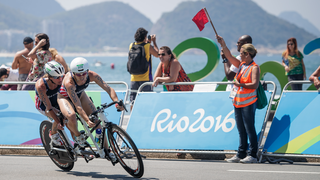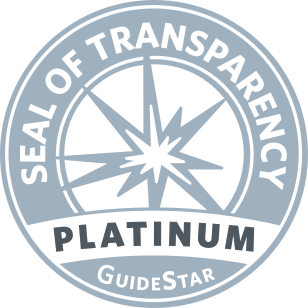No Limits for Determined Paralympian Triathlete
Beacon Stories
Paralympian Elizabeth Baker says that Stargardt disease has made her a tougher person.
Elizabeth Baker was diagnosed with Stargardt disease at the age of 15. At that time, Elizabeth felt like she was limitless, and nothing could bring her down. But once Elizabeth started college at the University of Georgia, her vision loss quickly declined and became more of a reality.

Elizabeth and her family on a hike.
“I definitely wrestled with a lot of challenges in trying to figure out how to learn when I could no longer see boards or books,” says Elizabeth. “I then realized that I could not control the amount of vision I would lose, but I could control how I responded to it. It was sink or swim, and I chose to swim.”
This “sink or swim” attitude has led Elizabeth to extraordinary feats. Now 45 years old, Elizabeth lives in Chattanooga, Tennessee with her husband, two children, and competes with the USA Paratriathlon Team, which features completing 750 meters of swimming, 20 kilometers of cycling and 5 kilometers of running.
I then realized that I could not control the amount of vision I would lose, but I could control how I responded to it. It was sink or swim, and I chose to swim.
Elizabeth raced in her first triathlon in 2004, but unfortunately crashed on her bike multiple times due to her lack of central vision. After that experience, she decided to continue racing as a visually impaired athlete, which entails competing alongside a guide, and started training for the Chattanooga IRONMAN. At age 40, Elizabeth completed her first IRONMAN and won her division.
The sport of Paratriathlon made its Paralympic debut at the 2016 Rio de Janeiro Games, which motivated Elizabeth to begin her intense training to join the USA team.
.png)
Elizabeth Baker and guide running in a triathlon.
Elizabeth qualified for the Rio de Janeiro Paralympic Games and has since raced in Australia, Japan, Switzerland, Spain and many other locations all over the world. But Elizabeth’s favorite part about being a Para triathlete is her teammates.
“Our team is made up of amazing athletes who race in different categories such as the wheelchair class, amputee class, and visually impaired class,” says Elizabeth. “All of these people are the highlight of my racing. Being a Para triathlete is more of a team sport for me, where my guide and I really have to be in sync.”
As Elizabeth plans to retire after the 2020 Paralympic Games, she hopes to use her triumphant experiences to be a resource and help advise those involved with the Foundation and blindness community.
“I would love to help others realize all the opportunities they can have regardless of their retinal disease,” says Elizabeth. “I have many days in my life where I’m in a grumpy mood. But during these times, I allow myself 30 minutes to “feel sorry for myself,” and then I move on and get over it. I have had these 30-minute “pity sessions” over the years, but as I have adjusted to living with Stargardt, I seem to need them less and less.”

Elizabeth (rear) and her guide race during the bicycling portion of a triathlon.
Although Elizabeth has had her share of challenges throughout life and her athletic career, she credits her Stargardt disease for making her a tougher person.
“I don’t think of my vision loss or diagnosis as something that limits me,” says Elizabeth. “It’s a part of me and although having limited vision isn’t the easiest, it’s made me the strong person I am today and opened new doors to accomplish some pretty amazing things.”




